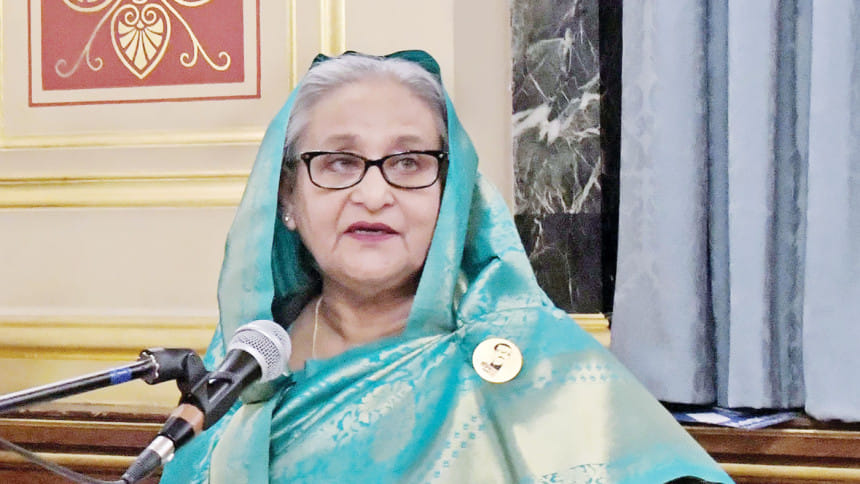Need to change ‘traditional lens’

Prime Minister Sheikh Hasina has called for a "reset" in Bangladesh-UK bilateral relations.
"We need to change the traditional lens we use to view our partnership," she said.
The PM also sought an active role of the international community in repatriating the Rohingyas to their homeland Myanmar, ensuring their safety and dignity. She said UK's role to this end remains critical.
She was addressing a programme titled "Bangladesh at 50: The Resilient Delta" at the State Rooms, Speaker's House, Westminster in London, on Wednesday.
Rushanara Ali, MP, and member of the House of Lords, Lord Jitesh Ghadhia, received the PM on her arrival at the Westminster.
Hasina said engagements of the two countries should now be truly strategic, and draw on their cooperation in peacekeeping, counter-terrorism, maritime and aviation security.
She said the vibrant British-Bangladeshi diaspora must remain at the centre of partnership of the two countries.
"We take pride in our diaspora. I am pleased to see their growing representation at the Westminster -- all five of them women at the moment! I am confident that there will be more of them in this great parliament of diversity," she said.
Turing to the Rohingya crisis, Hasina said that the UK's role in finding a solution to the crisis remains critical.
Since August 2017, Bangladesh has given stability to the region by containing the crisis, she added.
"But the security challenges in Cox's Bazar are getting more and more acute. These challenges can soon spread to the region and beyond," she said, adding that the international community has a responsibility to make sure that the Rohingyas can soon go back to Myanmar in safety and dignity.
Describing Bangladesh as a land of opportunities and promise at its 50 years of independence, Hasina said, "It draws strength from its resilient past. It stands ready to seize opportunities in the present. It looks to the future with a mission and a vision."
The PM also briefly spelled out Bangladesh's extraordinary achievements and developments in various sectors, including economy, infrastructural development, power and energy and digitisation.
She said that Bangladesh's economy has been growing at an average rate of over 6 percent, with 8.15 percent in 2018-19 fiscal year.
The premier continued that Bangladesh's GDP grew by 243 percent from 2008 to USD 310 billion in 2021 and the Bangladesh economy is now the world's 41st largest in nominal GDP.
The per capita income has increased three-fold from 2008 to USD 2,227 this year whereas the foreign currency reserve jumped seven-fold to USD 48 billion in 2021, she continued.

 For all latest news, follow The Daily Star's Google News channel.
For all latest news, follow The Daily Star's Google News channel. 




Comments